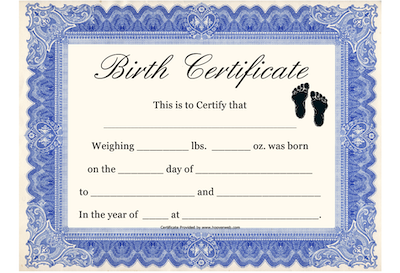Have you encountered this problem when researching birth records from 100 years ago or even earlier? In some parts of the U.S., this was a common practice.
I had to smile a bit when reading an article in the Boston Globe published several years ago about the "problem" of incomplete birth records. It seems the city of Boston has many birth records from years ago where the baby's name is simply recorded as “baby girl” or “baby boy.” The reporter wrote, "A generation ago — when more families had six or more children — babies without official first names were surprisingly common. Overwhelmed new parents would leave the hospital without completing birth certificate paperwork."
You can read more in the article by Andrew Ryan in the Boston Globe at: http://bit.ly/2pedZ7w. The same article tells how to amend a record and add a first name by providing documentation.
Actually, the "problem" is not unique to Boston nor to any particular area of the United States. An experienced genealogist probably can tell you of numerous similar examples. I have seen it many times, especially in the case of my mother and her siblings.
 My mother’s birth record at the town clerk’s office in Ashland, Maine, records her first name as “baby girl.” All of her older brothers and sisters were recorded as “baby girl” or “baby boy.” However, the younger siblings (of the 16 children) are recorded with their correct first names. The same is true for many, many other families in the same town, recorded in the same records.
My mother’s birth record at the town clerk’s office in Ashland, Maine, records her first name as “baby girl.” All of her older brothers and sisters were recorded as “baby girl” or “baby boy.” However, the younger siblings (of the 16 children) are recorded with their correct first names. The same is true for many, many other families in the same town, recorded in the same records.
When my mother had to get a Social Security card some years later, it was a minor problem. Since there was no birth record showing her true first name, she had to get affidavits from several people who remembered the event. That wasn’t hard for her since her mother (my grandmother) was still alive at the time and she gladly submitted an affidavit saying that she remembered the event well! Apparently, all of my mother's older brothers and sisters had to do the same when they applied for Social Security cards.
I have heard a number of different stories about why this practice was common, and some of those stories contradict the other stories. As a result, I don’t know what the truth is except that, after reading the town clerk’s records and the records of other town clerks in the area, I do know it was a common practice in the nineteenth and early twentieth centuries. Boston officials estimated that, in the 1950s, roughly 1 of every 25 birth certificates lacked a first name. I suspect it was even more common in many rural areas in mid-winter.
I will disagree with one statement in Andrew Ryan's article in the Boston Globe: "Overwhelmed new parents would leave the hospital without completing birth certificate paperwork." In the case of my mother, her siblings, and my grandmother, there was no hospital involved. The nearest hospital was more than 20 miles away, a difficult trip at any time of the year and impossible during the winters in northern Maine, where 3 or 4 feet of snow was common and the (dirt) roads were never plowed in the winter. (My mother was born in March.)
My grandmother gave birth to all 16 of her children at home. I suspect some of your ancestors did the same.
Who provided the information to the local town clerk? And when was the information provided? In my mother’s case, the town clerk’s office was “in town,” 5 or 6 miles away. That’s a long ways away over unplowed dirt roads in northern Maine where the snow in March was often more than 4 feet deep!
That was an impossible trip for my grandmother who had just given birth. She also had other children at home that required her care. So she undoubtedly did not provide the information to the town clerk.
My grandfather was not at home at the time as he was working in the woods (he was a French-Canadian lumberjack working in the deep woods of northern Maine. I doubt if he even heard of the birth of his newest child until he returned home in April or May.)
None of the other children supplied the information as they were too young to make such a trip into town in the arduous winter weather conditions.
So, who supplied the information? Unfortunately, the town clerk did not record that fact.
Was it the doctor? Probably not, as I was told that most of these children were born without a doctor in attendance. Was it a midwife or perhaps another, older relative?
I wish I knew.